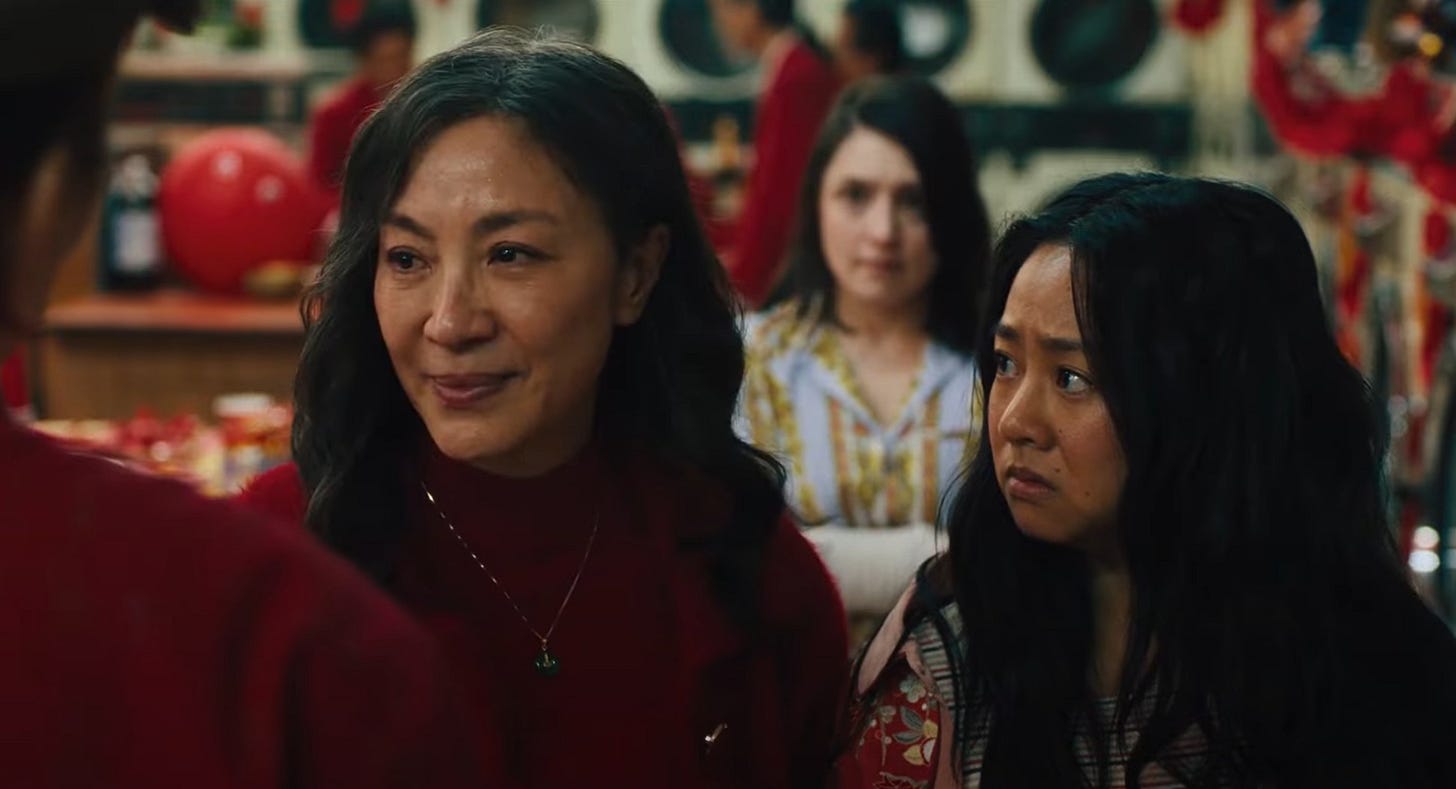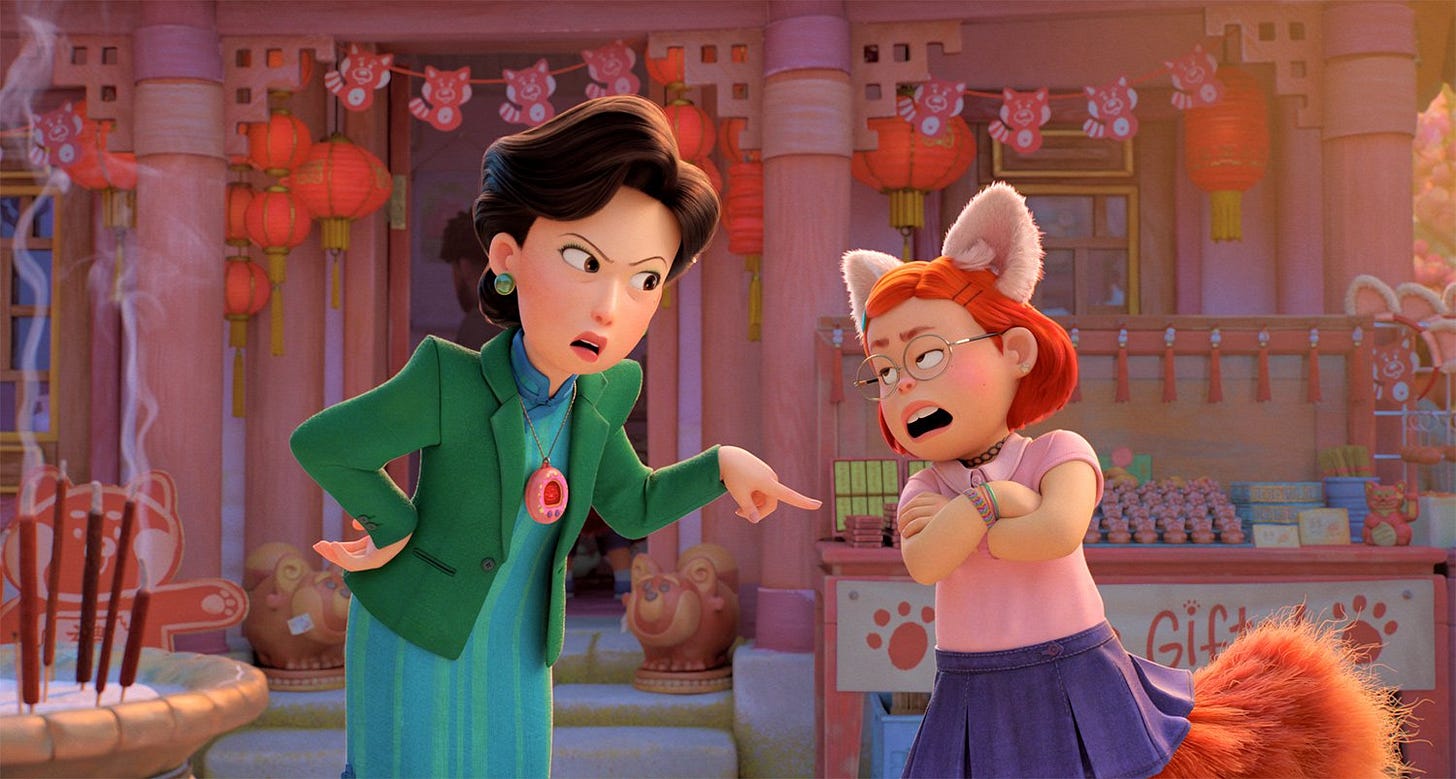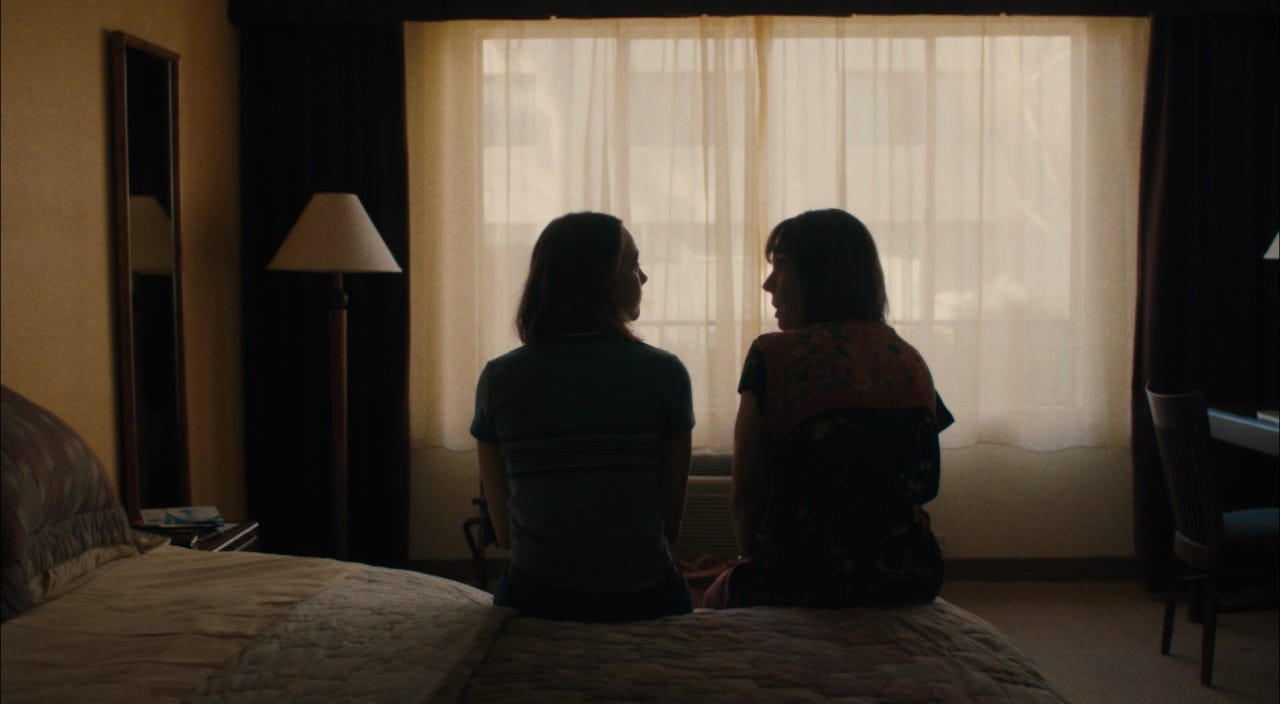Why mother-daughter stories matter more than ever
Stories full of feeling, frankness and much-needed freedom
It’s undeniable that brat summer has rejuvenated the honesty with which young women have expressed themselves in the past few months. My personal encounter with said honesty has most recently been encapsulated by the following image:
Combining this with the unhealthily common accusations of ‘fatherless’ or ‘motherless’ behaviour in TikTok comment sections, it feels right to assume that we are living in a time where relationships with our parents are either being patronised, glorified or vilified - our relationships with our parents matter. In turn, the stories about relationships with our parents matter.
Honest experiences are a large part of the reason why The Amateur’s Take was born: bringing lived experience to the unifying power of cinema is, in my humble opinion, one of the most palatable ways to normalise empathy in a particularly apathetic online climate.
In the spirit of that honesty, I absolutely hate most on-screen parent-child relationships.
They don’t tend to delve into the parent and the child’s story equally; leaving us susceptible to unfairly empathising with only one party. You turn away from the film to open your phone and as you’ve just finished shaking your head at the teenager in the movie, you’re laughing with teenagers on Instagram Reels. Total incongruity and no emotional sincerity. Or alternatively, you feel like the parent’s dialogue in the film was too much of a deep cut for you and you’ve tuned out for the sake of enjoying the rest of your evening.
Fact of the matter is, parent-child relationships deserve accurate and fair representations on-screen - especially in a time where the role of the mother and the daughter has become so weaponised. Our beloved brat summer has perhaps both unfairly villainised the mother, as well as overly infantilised the daughter. In times like these, we need honest, culture-spanning mother-daughter stories to prevail; to offer troubled motherhoods a hope for resolution, aid daughters in their mental conflicts and to continue the greatest story every told - the tale of womanhood.
If there’s a golden thread binding the films Turning Red, Lady Bird and Everything Everywhere All At Once, I’m convinced it’ll be the beautifully subtle resolutions between mother and daughter. Beautiful partly due to the emotional sincerity on display, thanks to stunning award-winning performances from Laurie Metcalfe, Saorise Ronan, Stephanie Hsu and Michelle Yeoh. (It goes without saying that hateful discourse around Turning Red almost undoubtedly impacted the awards it took home.)
Rewatching these three films was a bumpy ride, for sure. Watching Everything Everywhere All At Once the first time was the roughest cinema experience I’d had, especially having rows of people laughing at moments that didn’t feel funny to me. Nothing wrong with them laughing of course, but if anything, it felt isolating that such an accurate representation of daughterhood was not relatable to most. My thoughts from that winter evening in 2022 have stayed with me, and in part, motivated my choice for this week’s film selection.
The emotional unavailability of the mother in these films is painful. Marion’s patronisation of Lady Bird, Evelyn’s dismissal of Joy and Ming’s ignorance of Mei hurt to watch but they showcase the ultimate warning against poor motherhood: do not neglect your daughter, or she’ll be a poor mother too.
After scolding Lady Bird for leaving her clothes lying around after a night out, Marion is asked by Lady Bird if she never left her own clothes untidy as a child, to which she responds: “My mother was an abusive alcoholic.” Now, I’m a very vocal person when I watch films (unfortunately) and although my instant reaction was “Who asked?”, my immediate follow-up reaction was “This is a woman who was neglected too and now doesn’t know how to take care of her own.”
Almost identical to this is Evelyn’s absent parents (with barely any mention of her mother) facilitating an exceptionally unstable dynamic between her and Joy, her daughter. In direct contrast to Marion, Evelyn takes it upon herself to correct the damage done to her by the abandonment of her parents post-marriage by saying to her father, “I am no longer willing to do to my daughter what you did to me.”
This is a picture-perfect representation of how enmeshed cultural responsibility can be with the art of parenting, for better or for worse. This is also a picture-perfect representation of why these stories are so crucial: only through storytelling that showcases the harsh (and not exaggerated, for a change) realities of family life, can real-life corrections, apologies, changes be made.
Everything Everywhere All At Once is also an ode to the daughter’s confessional; how it kickstarts change in a mother-daughter relationship. The film’s depiction of Joy as villain Jobu Tupaki doesn’t trivialise Joy’s feelings of apathy but instead communicates how alien these emotions can be to Evelyn. She doesn’t understand how her Joy can be such an “agent of chaos” but she also doesn’t understand why she “doesn’t call even though we have a family plan” and why she has tattoos. Evelyn hasn’t sought solutions to her misunderstanding, she’s seeking compliance from her daughter to fill the gaps that don’t make sense.
On the other hand, Joy seeks the understanding that Evelyn doesn’t: in her quest to find Evelyn, she clarifies that she “never wanted to kill” her mother, but she was “looking for someone who could see like me, feel like me.” She wants so desperately to identify with her mother so she can cure the loneliness she feels. But, just like Lady Bird’s defence of Marion’s “big heart”, or Mei’s belief that Ming “just wants the best” for her, Joy had hope in her mother. However, that hope just wasn’t enough, and drove Joy over the edge, to a place with “no motives or desires”.
There’s another key moment in the last act of Everything Everywhere All At Once that really encapsulates the complexity of these stories. Joy says to Evelyn, “I know both the joy and the pain of having you as my mother.” Such honesty, such brutal honesty, is the stuff of healthy relationships and thus, the lesson to be learned from these films. Applause is very much due for the screenwriters of these films: Domee Shi & Julia Cho, the Daniels and Greta Gerwig, for showing us how only through expression can mistakes be realised and then be fixed.

Turning Red’s metaphorical red-panda-battles between mother and daughter are another testament to the incredible build-up that generational tensions can manifest. The semantics of curses, blessings and gifts bring with them that same sense of cultural responsibility that is an undeniable barrier to a true connection between Mei and Ming. It’s only through the breaking of the tradition (Mei’s decision to keep the curse/gift of the panda) that a better emotional understanding is manifested between the two.
Whilst in the safety of the ‘spirit realm’ during the age-old ritual (yet another indication of culture’s inevitable intertwining with the mother-daughter experience), Mei admits to her mother how obsessed she is with her approval. With their previous fight having been an emblem of mutual misunderstandings, Ming contributes to a major turning-point in their relationship as she responds with, “If I taught you to do that, I’m sorry.” Through Mei’s confidence to share with her mother (similar to Joy’s confession to Evelyn) they have been able to embark on a reparative path.

Where brat summer might be making daughters cry at the realisation of the yet-to-be-fixed disconnect between them and their mothers, mothers aren’t really being offered the same opportunities for such impactful revelations.
Perhaps this is the effect of my past cultural responsibility, but when I sit and listen to Apple by Charli XCX, I wonder if there is anything that makes my mother think of things in the same way that pop culture affords me the ability to. Perhaps this is the origin of the dissonance between Marion and Lady Bird. In her letters at the end of the film, shown only for a few moments, Marion writes how she wishes she could “understand” Lady Bird but she remains “in awe” of her. We never see examples of Marion exhibiting these emotions: but that’s immaculate evidence of our problem.
When does Marion breathe? When does Marion sit to listen to music and cry? When does she get to draw on her walls and leave her clothes untidied? Sure, our first thought is: she got to do that when she was only a daughter and not a mother - she has bills to pay, a depressed husband and double shifts to work on the wrong side of the tracks.
But what if our mothers don’t get to be daughters?
These stories show us how important daughterhood is, not just the weight of a mother’s responsibility to get it right. Unless a daughter gets to be a daughter, how can they be expected not to harbour jealousy for their daughter’s laziness (Lady Bird), or hatred for their daughter’s perceived deviance (Everything Everywhere All At Once) or anger at their daughter’s desires (Turning Red)?
Daughters need these stories and they need to watch them with their mothers. They need a reason to remember why they should call home, why they should visit and maybe sometimes, they need a reason to remember why they should leave it a little longer the next time.
I’m not a mother, I’m only a daughter and a sister and a girlfriend. But these films remind me my mother is human: my mother is a daughter too.
Maybe I should watch these films with her.






Beautiful read! You put into words how I felt watching Everything Everywhere All At Once for the first time. Really loved that both Evelyn & Joy's personal struggles felt balanced and valid, and these balances are crucial in providing a nuanced portrayal of such dynamics, until it coalesces into that moment of catharsis and revelation. It's a film that helped me personally along with Lady Bird, and your writing reminds us to not treat motherhood or daughterhood with such apathy.
This was really well written, and unpicked things in those 3 films that I hadn’t thought about before, particularly around how mothers might never have had the chance to be daughters. Our mums were just little girls giggling with their friends, with untidy bedrooms, fighting with their siblings and eaten junk food, once upon a time. Well, I hope they were. I hope they were able to be.